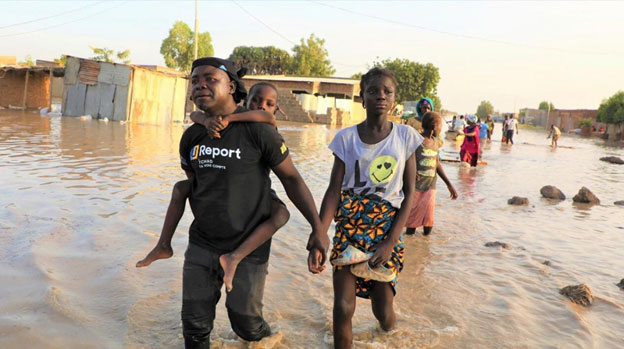Nigeria Prioritizes Climate Action to Mitigate Natural Disasters

ABUJA, Nigeria, Jan 02 (IPS) - In 2022 alone, flooding killed at least 662 people, injured 3,174, displaced about 2.5 million, and destroyed 200,000 houses individuals.
As far back as 2012, the World Bank reported that erosion was affecting over 6,000 square kilometres of land in the country, with about 3,400 square kilometres highly exposed.
Back then, gully erosion was doing an estimated $100 million worth of damage each year, according to the team behind the Nigeria Erosion and Watershed Management Project (NEWMAP).
Under the NEWMAP, the country began working with the World Bank to rehabilitate degraded lands and reduce erosion and climate vulnerability in 23 states. The project had four work streams:
- Investing in erosion and watershed management infrastructure to reduce land degradation,
- Developing information services to strengthen erosion and watershed monitoring and disaster risk management,
- Strengthening Nigeria’s strategic framework for climate action to promote low carbon development, and
- Supporting project management at federal and state levels with financial, social and environmental safeguards and oversight, outreach, and project monitoring and evaluation.
The outcomes reported in 2021 were positive: the project benefitted 35,000 people directly and more than 100,000 indirectly through small grants to community interest groups. The team trained 185,058 persons, 42 percent of them women.
On the first work stream, the project more than doubled the land under sustainable management, completed nearly five dozen participatory surface water management plans and reduced gully erosion considerably.
On the second, it made drafted environmental impact assessment guidelines and launched over a hundred automated hydrology and meteorology and flood early warning systems in the region.
The government is restoring lands in the northern states of Bauchi, Jigawa and Sokoto by planting thousands of tree seeds and seedlings.
On the third, the country issued green bonds to spark private investment in climate smart projects, such as distributing fuel-efficient cookstoves and developing solar-based electricity generators for rural health centers.
On the fourth, the team tested the use of remote sensing, geographic information system techniques, and 360-degree cameras and drones for remote supervision and grievance resolution.
Overall, NEWMAP showed Nigeria’s appetite for action and results.
Calls for accelerated action
Currently, about 178 local government areas (LGAs) in 32 of 36 states in Nigeria and the Federal Capital Territory fall within the highly probable flood risk areas, according to the Nigeria Hydrological Services Agency (NIHSA). Another 224 of the country’s 744 LGAs fall within moderately probable flood risk areas, and 372 fall within probable flood risk areas.
Nigeria’s more than 830 kilometres of coastline are increasingly threatened by floods, erosion, water and air pollution. Communities in the Niger Delta states bordering the Atlantic Ocean have lost or fear losing their homes and farmlands due to the eroding bedrock shielding the shoreline.
Forests are disappearing because of desertification. According to Action Against Desertification, only half the forests that existed in 2007 remain in the area where it operates.
Suleiman Hussein Adamu, minister of water resources through May 2023, had warned that floods would take a high toll on life and livelihoods, agriculture, livestock, infrastructure and the environment.
The frequency of natural disasters in the country links to climate change, according to Alhaji Musa Zakari, director of human resource management at the National Emergency Management Agency, responsible for managing disasters in Nigeria.
“Nigeria may need to re-examine some fundamentally new and more efficient approach to disaster management,” Mr. Zakari said in an interview.
New approaches
In August, Nigeria’s National Defence College (NDC) presented the government with its research findings, “Building Climate Resilience for Enhanced National Security: Strategic Options for Nigeria by 2035.” It recommended adopting strategies to achieve the short-, medium- and long-term objectives in climate adaptation programmes.
Vice President Kashim Shettima said the current administration was prioritizing climate change interventions to address desertification, coastal erosion and flooding by collaborating with relevant individuals and institutions.
The government shares the “concerns for the security implications of underestimating the devastations of climate change,” he said, while receiving the NDC report.
Part of the government’s strategy is to inform the public of preventive measures that save lives and reduce damage to property and infrastructure.
In addition, through the Great Green Wall initiative, which aims to increase the size of arable land in the Sahel, the government is restoring lands in the northern states of Bauchi, Jigawa and Sokoto by planting thousands of tree seeds and seedlings.
Said Vice President Shettima, “It is heartening to witness the alignment between findings and our government’s policy objectives, reinforcing our belief that a holistic and comprehensive approach is essential to tackling these challenges effectively.”
Source: Africa Renewal, a United Nations digital magazine that covers Africa’s economic, social and political developments.
IPS UN Bureau
Follow @IPSNewsUNBureau
Follow IPS News UN Bureau on Instagram
© Inter Press Service (2024) — All Rights Reserved. Original source: Inter Press Service

